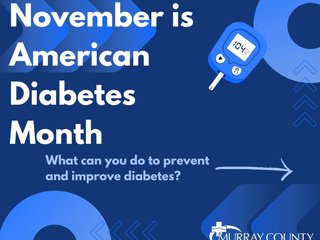Blog
American Diabetes Month

What can you do to prevent and improve diabetes?
November is National Diabetes Month, a month designated to bring awareness to diabetes. This year's focus includes taking action to prevent diabetes health problems. Diabetes is a disease that happens when your blood sugar (blood glucose) is too high. If left uncontrolled, diabetes can damage numerous parts of your body including your eyes, kidneys and heart and is linked to some types of cancers.
Controlled diabetes is when a person's blood sugar levels are kept within a healthy range. This can be achieved through a combination of lifestyle habits and medication, if necessary. Start by managing your Diabetes ABC's, this includes managing and reaching goals for your A1C, Blood Pressure, and Cholesterol . Next, work towards adapting healthy lifestyle habits as these can help manage as well as prevent the development of diabetes.
A good first step is to work towards is aiming to eat a balanced diet. This may be slightly different for each person based on their needs, but typically this should include fruit, vegetables, protein, grains, dairy and regularly consuming water as your main beverage. An important goal to consider getting to is reaching and maintaining a healthy weight. A variety of health conditions are vastly affected by our weight which is one of the reason it tends to be discussed often at doctors visits and in society.
Another healthy habit is aiming to get adequate exercise. Physical activity helps move glucose into your cells, making your body better able to absorb insulin. The American Heart Association recommendations for adults include at least 150 minutes a week of moderate aerobic activity or 75 minutes a week of vigorous activity (or a combination of the two), plus strength training. For some people, aiming to get to the gym five days a week is the best for them. For others, age and health dependent, getting a couple of small walks or 10 minute exercise sessions in a day might be the best for their life. All exercise is important and finding what you can routinely schedule into your life is a great way to start.
Regular sleep is also important and taking the necessary steps to achieve this is very important. Not getting a proper amount of adequate sleep can cause your body to have higher stress levels and disrupt your body’s natural insulin production. A few ways to improve your sleep quality: set a sleep schedule by going to bed and getting up at the same time, optimize your sleep environment by creating a dark and quiet room, and discuss any sleep concerns with your provider.
It might seem overwhelming to make a multitude of changes all at once. It is entirely okay to plan small changes and build from there. Decide what’s the easiest first. This might be meal planning healthier meals, increasing your daily step goal, or even optimizing your sleep. “You don’t have to do it all at once. Start slow and build healthier habits from there” (National Diabetes Month 2024 - NIDDK 2024).
Understanding your risk for diabetes will help you set proper goals when it comes to a healthier lifestyle. If you are overweight or obese, you’re more likely to develop type 2 diabetes (National Diabetes Month 2024 - NIDDK 2024). Those who are 35 and older, have a family history, and are not currently physically active also have a higher risk of developing diabetes. If you have any of these precursors and have concerns regarding your blood sugar, reach out to your doctor today. They, along with a diabetes educator, will work with you to set up a plan including medication management, if needed, that works best for you.
Murray County Medical Center Diabetes Education is accredited by the American Diabetes Association and focuses on providing you with the knowledge and skills necessary to manage and take care of your diabetes. Betsy Plotz, our registered dietician and educator, has over 18 years of experience in helping patients. If you are interested in meeting with our educator, please contact her by calling 507-836-1421
For more information regarding preventing diabetes, please visit: https://www.niddk.nih.gov/health-information/community-health-outreach/national-diabetes-month
References:
U.S. Department of Health and Human Services. (2024, August). National Diabetes Month 2024 - NIDDK. National Institute of Diabetes and Digestive and Kidney Diseases. https://www.niddk.nih.gov/health-information/community-health-outreach/national-diabetes-month